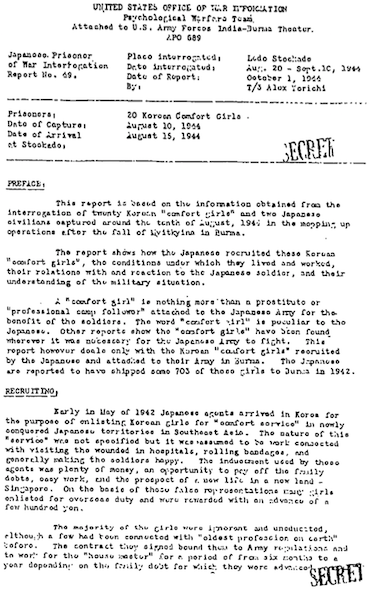When confronted, “comfort women” deniers like Tony Marano often attempt to deflect the label “denier” by arguing that they do not “deny the existence of comfort women.”
But like “Holocaust denial,” the phrase “comfort women denial” refers not just to the complete denial of the existence of “comfort women” altogether, but also to the denial of important aspects of the historical events that are established as facts. A casual look at the claims made by known Holocaust deniers reveal eerie similarities between Holocaust denial and “comfort women” denial (and this comparison between denialisms stands even if, as some contend, two atrocities themselves should not be compared to each other).
Mark Weber, the long-time director of the Holocaust denial organization Institute for Historical Review has said in a 1992 interview:
If by “holocaust” you mean the political persecution of Jews, some scattered killings, if yo mean a cruel thing that happened, no one denies that. But if one says that the “holocaust” means the systematic extermination of six to eight million Jews in concentration camps, that’s what we think there’s no evidence for.”
The IHR also posted on its website the following until at least 2009:
The Institute does not “deny the Holocaust.” Every responsible scholar of twentieth century history acknowledges the great catastrophe that befell European Jewry during World War II. All the same, the IHR has published detailed books and numerous probing essays that call into question aspects of the orthodox Holocaust extermination story, and highlight specific Holocaust exaggerations and falsehoods. IHR publications have devoted considerable attention to this issue because it plays an enormously significant role in the cultural and political life of America and much of the world. As a number of Jewish scholars have acknowledged, the “Holocaust” campaign is a major weapon in the Jewish-Zionist arsenal. It is used to justify otherwise unjustifiable Israeli policies, and to extort enormous sums of money, especially from European countries and companies.
Another denier, Christian pastor Herman Otten wrote in an IHR publication:
There is no dispute over the fact that large numbers of Jews were deported to concentration camps and ghettos, or that many Jews died or were killed during World War II. Revisionist scholars have presented evidence, which “exterminationists” have not been able to refute, showing that there was no German program to exterminate Europe’s Jews, and that the estimate of six million Jewish wartime dead is an irresponsible exaggeration.
“Comfort women” deniers frequently make similar arguments denying important aspects of the historical consensus.
The author does not deny the occurrence of isolated cases such as the Semarang Incident in the Dutch East Indies in which Ms. Jan Ruff O’Herne was involved. It was an apparent “war crime” in Indonesia committed by military personnel. […] However, this was an isolated case and should not be used to characterize or to generalize the state-managed Comfort Women System.
– Hiromichi Moteki, Society for the Dissemination of Historical Fact (Source)
It is more than funny how some strident activists in the US are depicting me as “Comfort girls denier”. That’s hilarious. Nobody in Japan denies them OMG! (((o(*゚▽゚*)o))) Neither do I.
– Yujiro Taniyama, film producer of Scottsboro Girls (Source)
These guys on the photo are saying “there was no “military” comfort women forced by Japanese army but not denying the existence of the comfort women.
– Shunichi Fujiki, Texas Daddy Japan Secretariat (using pseudonym, Source)
I am labeled “comfort women denier,” but it should be “comfort women = sex slaves” denier to be accurate. Language must be used precisely. False premises lead to confused arguments.
– Kiyoshi Hosoya, Japan Family Values Society (translated from Japanese, Source)
Similarities between Holocaust denial and “comfort women” denial do not end here. For example, they both often promote conspiracy theories that those who are preserving historical memory are operating under nefarious geopolitical or financial motives:
As a number of Jewish scholars have acknowledged, the “Holocaust” campaign is a major weapon in the Jewish-Zionist arsenal. It is used to justify otherwise unjustifiable Israeli policies, and to extort enormous sums of money, especially from European countries and companies.
– Institute for Historical Review (Source)
It’s important to note that the countries that are making a big fuss over this are China and South Korea […] This is not about human rights or sex-slavery. This is about politics, money, and racism towards Japanese. In other words, this issue is a geopolitical tool that China uses to attack Japan.
– Michael Yon, “journalist” (Source)
The Comfort Women Mafia has been successful in placing plaques and a statue memorializing their version of the Comfort Women story in communities all across the United States. Why? […] Very simple: The Comfort Women Mafia’s one area of motivation is to bash Japan. Their goal is to tarnish the image of Japan among the populace in the USA.
– Tony Marano, video blogger (Source)
There are many other similarities, but that is not really the point here. The point we are trying to make is that “comfort women” deniers are those who deny important aspects of established historical facts about the Japanese military “comfort women” system, just like Holocaust deniers are those who deny important aspects of established historical facts about the Holocaust, whether or not they concede that the Holocaust may have taen place in some form.

